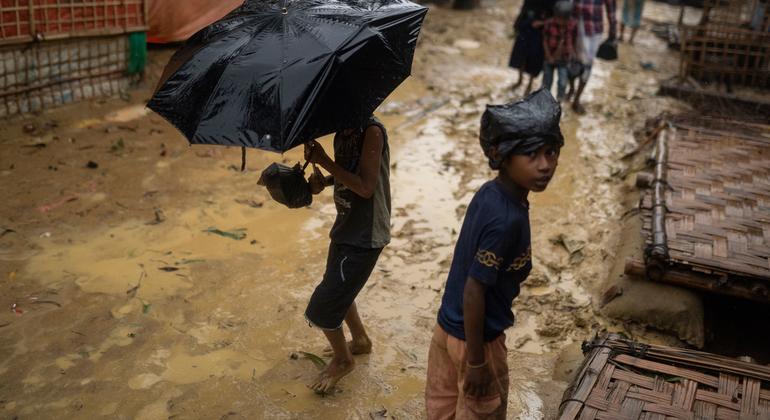Cyclone Mocha leaves a “trail of destruction” in Myanmar

OCHA said that the communities there have spent the day clean up, and count the cost of the storm, classified as Severe, when it broke into Myanmar’s western state and regions on Sunday, with gusts as strong as 250km per hour – continued to lash some areas the next day, with heavy rain.
Authorities and humanitarian aid agencies have launched a massive evacuation plan before the storm hits the northern coast of Sittwe.
Six million is already needed
Humanitarian needs in Rakhine state and northwestern Myanmar were already dire before the typhoon, with up to six million people already in need of relief aid, according to OCHA, as a result of years of conflict and displacement.
Today, millions of Rohingya people live in temporary shelters where their movements are restricted by the military government, which declared all of Rakhine a disaster zone in the wake of Mocha.
Initial reports indicated that the worst of the storm was sheltering the main Rohingya refugee camp complex of Cox’s Bazar in Bangladesh, which is home to nearly a million Rohingya refugees, most of whom are fleeing persecution and violence in Rakhine, started in the summer of 2017. .
Much of Sittwe was destroyed
But news reports show that although it is not as bad as predicted, many are still killed in Myanmar, and hundreds of thousands of Rohingya are left homeless.
OCHA says it is available widespread destruction across Sittwe, with some houses left standing. Many of the unsteady bamboo houses of the displaced camps were demolished.
“Communications with groups on the ground are also limited but initial reports suggest that damage is significant, especially in Rakhine, and shortages across all areas will be high“, said the OCHA situation report on Monday.
“Very strong winds knocked down power lines, uprooted trees and damaged houses. The storm knocked out bridges and flooded buildings. “
Health, relief, shelter, and water, sanitation, and hygiene needs are already reported, with additional deadly threat of landmines in conflict-affected rural areas, which changed during the flood.
Cyclone Mocha brings heavy rain and wind while passing a Rohingya refugee camp in Teknaf, Cox’s Bazar, Bangladesh on May 14, 2023.
Cell towers are destroyed
Communications with partners on the ground are partially restored during the day but are still limited later serious damage to communication towersOCHA continued.
Water and power services have been severely disrupted throughout the day with generators now the main source of electricity for many people due to downed lines.
Humanitarian partners are working to get started urgent need assessments in place on Tuesday, to confirm the magnitude of the impact from the cyclone and the immediate assistance required.
Initial reports have also begun to emerge of widespread flooding and needs in the north-west – an area still heavily affected by the conflict.
A Rohingya refugee camp in Cox’s Bazar is preparing for Cyclone Mocha.
Funding is urgently needed
OCHA said urgent injection of money to aid recovery is “essentially needed to facilitate a full-scale response to the impact of the cyclone and subsequent flooding.” To date, the $764M Humanitarian Response Program (HRP) is 10 per cent funded.
Some IDPs are still in hurricane shelters near displacement camps, as well some reports of injuries and needs for health care. Those living in temporary shelters, such as schools, need help.
Transportation is challenging and debris removal is ongoing. Heavy traffic was reported during the day due to large numbers of people returning to their Sittwe homes from inland areas, combined with garbage on the roads.
Rohingya shelters have been destroyed
News reports suggest that around 3,000 Rohingya shelters have been destroyed during the life of Mocha, with some completely destroyed. The country’s refugee commissioner reported damage to 32 educational institutions, and 29 mosques.
In refugee camps where 120 landslides were reported, at least 5,300 refugees were reportedly moved to more secure locations, while the Bangladesh Government said around. 250,000 are in need of food and shelter across the region overall by Sunday night.
Authorities in Bangladesh have evacuated 750,000 people ahead of the storm.






